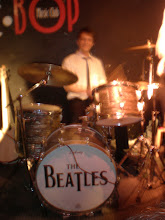If you haven't read yesterday's blog, chew on that first! If you're hungry for more, keep reading here...
Upon later conversations with Morgenstern, the rational behind the unique selection of compositions was made clear. After seeing the Barkauskas Partita piece listed in a concert program in Russia, Morgenstern was immediately reminded of Bach and sought pieces with comparable dance rhythms, which would complement each other.
Riconscenze per Goffredo Petrassi by Carter was also very deliberate as the piece was composed as a dedication to well-known Italian composer Petrassi and this year also marks Carter's 100 birthday.
The Dante Suite by Saylor was an obvious choice for many reasons, not the least of which being Dante Alighieri was a Florentine. Though he was exiled from the city for political reasons, Dante is still well loved here in Firenze and even has his own monument outside of Santa Croce, though he is not buried in the church.
The piece was also appropriate for Morgenstern as he, along with writer Jonathan Levi, toured a stage production of Dante's Inferno based on Robert Pinsky's translation of the classic epic. The duo even formed a theatre group with a name inspired by the nine circles of Dante's Inferno and call themselves, the Nine Circles Chamber Theatre. Since it's creation, the theatre has created and performed seven stage productions, combining a wide spectrum of artistic talents ranging from music and acting to dancing and visual arts.
The entire program was very well constructed; mixing classical and modern pieces ranging from 1720 to 1997 and overcame the challenges of a solo string performance. Because string instruments cannot sustain chords, counterpoint and harmony are impossible. "I programmed works that I thought overcame those challenges and were at the same time, 'violinistic'," said Morgenstern.
The performance was also inspiring from another perspective.
"I usually joke that the average age for classical audiences is 'deceased'," said Morgenstern. "I can't state strongly enough how wonderful and exciting it was to see younger people in the audience...The energy I felt from the students was especially invigorating because, whether they enjoyed it or not, they were extremely attentive. We can't ask for more than that."
Music, like every art form has and will continue to change over time. However, the importance of understanding the roots and beginnings of the classics and acquiring a respect for the masterpieces, which have preceded the art of today, is so crucial to forming a well-rounded human being. "Ultimately, the arts are a civilizing force; without them we face a civilization without the 'civil' component," added Morgenstern.
This is one of the most important lessons I have learned while studying here in Florence. It is impossible to grasp the importance of and skill needed to compose and create the art surrounding me here, but it is essential to try. The slow death of the arts in school programs and lack of emphasis on true artistic creations in media is both tragic and ominous.
"The lack of arts education both in the schools and at home (used to be that everyone could have a piano rather 6 television sets) is devastating in my view," said Morgenstern. This shift of emphasis from art to entertainment and the blurred line between them is an issue worth addressing, though on the greater list of war, economics and health, seems to fall by the wayside among the political issues of today. With that in mind, the best each of us can do is try to seek out and appreciate the opportunities we all have to see, hear and learn from the art all around us.
This Valentine's Day I did not receive a typical gift. I received something much better: the chance to see and hear art come alive, meet an incredible musician and revive my own personal appreciation for something much bigger than myself. Viva l'arte.
Subscribe to:
Post Comments (Atom)










No comments:
Post a Comment